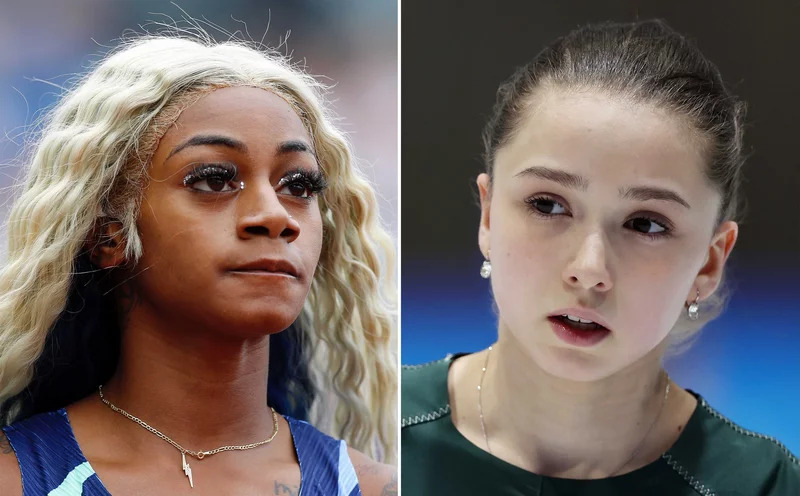Richardson and Valieva: A case comparison
February 19, 2022
In the 2020 Tokyo Olympics, Sha’Carri Richardson was suspended for one month after failing her drug test due to cannabis in her system.
Yet, in the 2022 Beijing Olympics, Kamila Valieva, who also failed her drug test due to trimetazidine, was not suspended.
Some people, including Richardson, say that racism is the reason. Others point to the rules and say that settles the matter.
While this may not solve the issue, it may help to more closely examine both the rules and the drugs involved in both cases.
Sha’Carri Richardson’s case:
Richardson had cannabis in her system at the time of her drug test, which can be found in The World Anti-Doping Code’s (WADC) “International Prohibited List 2021” on page 17, which states that cannabinoids, natural and synthetic alike, are prohibited.
An interesting thing to note, however, is that cannabis is specified as only “prohibited in competition,” not out of. What’s equally as important is that weed is not considered to be a performance-enhancing drug.
But why did she have cannabis in her system in the first place?
Richardson used cannabis as a way to cope with her mother’s death while she was in Oregon for the Olympic trials–so, grief. Could she have perhaps pled therapeutic use?
The answer, unfortunately for Richardson, is that she couldn’t have requested a Therapeutic Use Exemption (TUE).
According to the United States Anti-Doping Agency’s (USADA) “TUE: Therapeutic Use Exemption Policy,”international-level athletes who need a TUE must apply “prior to using or possesing the substance or method in question.”
Furthermore, according to the “Therapeutic Use Exemptions” page on the World Anti-Doping Agency’s (WADA) website, it says that athletes who have a medical condition may apply.
Grief does not qualify as a medical condition, so even if Richardson had applied for a TUE, she wouldn’t have been able to obtain one.
Because of this, Richardson received a one-month suspension.
Valieva’s Case:
Valieva, on the other hand, tested positive for trimetazidine. In an interview with NPR, cardiologist Eugene Depasquale said that trimetazidine “helps in the metabolism of fatty acids. And by doing so, it can actually help the ability of the body to use oxygen, which can help performance and help relieve those chest pains brought on by the blocked blood vessels.”
It is, in short, a performance-enhancing drug, and thus a prohibited substance.
Similarly to cannabis, trimetazidine can be found in the WADC’s “International Standard Prohibited List 2022”, on page 11 under “4. Metabolic Modulators.”
She was not suspended, however, for a number of reasons.
According to the media release from the Court of Arbitration for Sport (CAS), she was not suspended primarily because she is a minor, in combination with the “untimeliness” of the results.
The WADC qualifies people who are under the age of 18 as a minor, a definition that serves the 15-year-old Valieva, but not Richardson, who was 19 at the time of the 2020 Tokyo Olympics.
This brings forth the second point that the CAS media release said: the WADA and Russian Anti-Doping Agency (RUSADA) are “silent with respect to provisional suspension imposed on protected persons.”
In essence, the WADC and RUSADA say nothing about applying the regular rules of suspension to minors, so the court chose not to give the Russian figure skater a suspension.
Summary:
- Valieva is:
- A minor that failed a drug test but was not suspended because of the combination of the results’ untimeliness, the rules regarding minors, and the lack of guidance from the WADC regarding suspending minors.
- Positive for trimetazidine, which is classified as a performance-enhancing drug due to its capabilities to help the body make better use of oxygen, which Valieva’s lawyer claimed she accidentally became contaminated with because her grandfather uses the drug.
- Richardson was:
- Over the age of 18, thus disqualifying her from being a Protected Person under the WADC, and thus subject to provisional suspension at the court’s discretion.
- Tested positive for cannabis, which is not a performance-enhancing drug that is banned in–but not outside of–competition.
While there are likely more factors at play, both Richardson’s case and Valieva’s case have interesting points that bore different results, but one thing remains the same: both decisions have caused controversy in the media and the world of sports.




